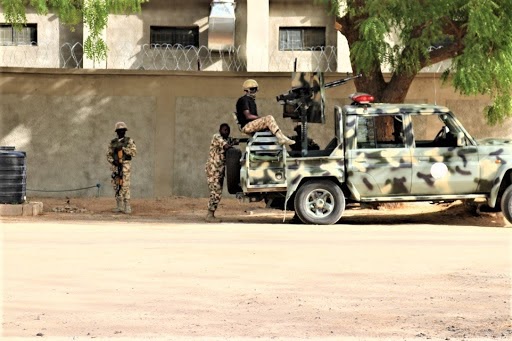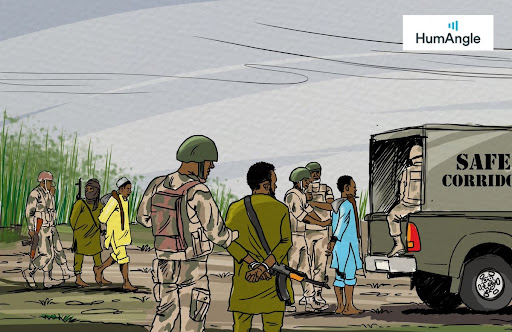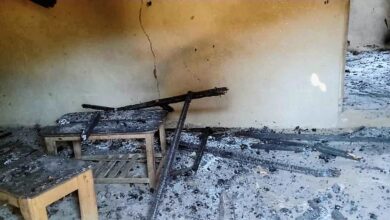Insurgency: Nigeria Releases Detainees After 6 Years But Leaves Them Stranded
The men, though absolved from blame, were not given any form of compensation. Many are in the lurch — as they are neither allowed into IDP camps in Maiduguri nor given money to board taxis to towns outside the city. An experience that is meant to be joyful for them and their families has consequently turned sour.

Over a week after the Nigerian Army released them, former detainees at Giwa barracks lament that they have not been given any support to aid their reintegration and are not allowed into displacement camps in Maiduguri, the Borno state capital.
Since the Boko Haram insurgency erupted, especially between 2015 and 2016, thousands of people have been victims of mass arbitrary arrests. The military accuses them of having ties with Boko Haram. But according to Amnesty International, these arrests were “largely based on random profiling of men, especially young men, rather than on reasonable suspicion of having committed a criminal offence”.
Many innocent people are, as a result, kept at the Giwa detention facility in Maiduguri, Borno Maximum Security Prison, and Wawa military barracks in Niger State. Hundreds of these men have been infrequently released over the years in different batches, some after facing speedy trials or being made to go through a deradicalisation programme.
On July 15, the Army announced that it had released a fresh batch of 1,009 detainees after clearing them of wrongdoing the previous day, maintaining that they were “not ex Boko Haram fighters.”
HumAngle gathered from people monitoring the developments that, so far, over 500 people have been released. But they are those previously kept at Giwa barracks and do not include detainees cleared at the Maximum Security Prison.
Out of this figure, over 30 were identified as husbands of members of the Knifar Movement, a group of women formed in 2017 to advocate for their spouses’ freedom.
The released men had first been taken to a transit camp at a rehabilitation centre in the state capital before they were allowed to go.
Meanwhile, sources on the ground informed HumAngle that on Sunday morning, about 14 former detainees who visited the Dalori II Internally Displaced People (IDP) camp for shelter were denied access by the security officials at the entrance who “claimed that they had not been notified by their superiors.”
Seven of them with families in Banki, a town in the Bama Local Government Area (LGA), were instructed to go there. But since they were not given any money upon their release, they had to beg to attempt raising the transportation fare.
“Unfortunately, they were not given one kobo. In fact, most of the men were wearing singlets; some of them don’t even have shoes on. The women had to go round to look for slippers and shirts to give their husbands before they paid taxi from the [rehabilitation] centre to the IDP camps,” one source said.
“The seven men [directed to Banki] don’t even have transport money to go as of this morning. They are trying to beg and see if they can get transport fare to travel to meet their wives, but they are also not sure if they will have access to the camp because the ones that are in Maiduguri that is even closer to Giwa barracks denied them access. So what will happen to those that will travel to Banki?”
These complaints are coming despite the acknowledgement from the Nigerian Army in its statement that detainees found to be innocent are meant to be “cleared and released to the state government for rehabilitation before they are reintegrated into the society.”
When HumAngle reached out to Isa Gusau, Special Adviser on Public Relations and Strategy to the Borno State Governor, for clarification, he said he was not aware any detainees had been released.
Brigadier General Onyema Nwachukwu, the Director of Army Public Relations, on the other hand, replied on Sunday afternoon that he would get back to us as soon as he receives information on the complaints.

The difficulty in entering IDP camps for ex-detainees is not new as previous victims had described having to stay under trees outside the camps or travel to other communities before they were finally admitted. But reports suggest that the authorities are more forceful and uncompromising this time.
Former detainees who tried to enter the Dalori II camp on Sunday were reportedly turned away by soldiers, who said new IDPs would not be admitted and asked them to return to their respective Local Government Areas, insisting that they were now peaceful. HumAngle understands entries into the camps have become more restricted over the past days and this has put the long-time separated couples in a state of confusion.
The Borno state government has for many months been working towards the closure of all IDP camps and the resettlement of displaced persons, despite the unabating nature of the insurgency.
The husband of Fatima Abatcha, who is from Bama LGA, is one of those released recently following his detention back in 2015. She had not seen or heard from him until he regained freedom and she had had to raise their children by herself. He was, however, not allowed to enter the camp when he arrived yesterday morning.
“I do not know where my husband has gone to as the soldiers ordered that none of them should dare step into the camp, so he had to leave with the others,” she told HumAngle tearfully.
“I appeal to the governor and the military. Our village is deserted and our husbands have nowhere else to go. The governor should please plead with the Nigerian military to allow our husbands to stay in the camp until our communities are safe enough for us to return there.”
A second displaced woman wondered why their husbands were detained for over six years only to be denied an opportunity to reunite with their loved ones.
“These men were arrested after they fled their communities; they were not picked up in their communities. They were picked up when they fled to Bama. Why would you release somebody after six years with only a singlet?” she asked. “Not even a pair of bathroom slippers, not even transportation from where they were released to the IDP camp. Yet you want them to travel long distances.”
“And people don’t go to any of these places without escorts,” she added.
“How do they want him to move? Do they want him to move on foot through the bush for him to either be picked by the military again as a Boko Haram suspect or for Boko Haram to kill him? If after this night, we don’t have an opportunity to reunite, we will have no option but to pack our things and live on the streets of Maiduguri with our husbands.”
Many members of the Knifar Movement are still aggrieved and anxious, praying with their hearts in their mouths that their husbands would be among those to be released in the coming days. Those who have not reunited with their spouses after several years still run into the thousands. Most are not sure what to expect. But then, the group’s leadership estimates that about 70 per cent of the men are detained at the Maximum-Security Prison, not Giwa barracks, based on information received from those released in previous years. This, for them, is reason enough to keep hope alive.
This report is part of a series of publications supported by the African Transitional Justice Legacy Fund (ATJLF) under HumAngle’s ‘Mediating Transitional Justice Efforts in North-East’ project.
Support Our Journalism
There are millions of ordinary people affected by conflict in Africa whose stories are missing in the mainstream media. HumAngle is determined to tell those challenging and under-reported stories, hoping that the people impacted by these conflicts will find the safety and security they deserve.
To ensure that we continue to provide public service coverage, we have a small favour to ask you. We want you to be part of our journalistic endeavour by contributing a token to us.
Your donation will further promote a robust, free, and independent media.
Donate Here




